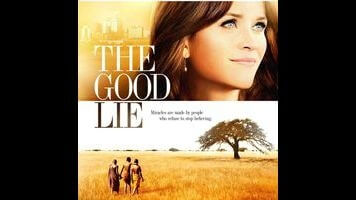Insofar as a work of fiction can be complimented for not completely succumbing to the worst instincts of its authors, The Good Lie—the English-language debut of Québécois director Philippe Falardeau (Monsieur Lazhar)—deserves some very faint, very qualified praise. Set mostly in the early 2000s, the movie follows three Sudanese refugees—Mamere (Arnold Oceng), Jeremiah (I Heart Huckabees’ Ger Duany), and Paul (Emmanuel Jal)—who’ve resettled in Kansas City as they adjust to life and work in the United States, and try to reunite Mamere with his sister, Abital (Kuoth Wiel). Written by Red Band Society’s Margaret Nagle, it’s a sappy, but occasionally sensitive, coming-to-America story that hits all of the familiar beats. It has one very big problem, though, and she’s played by Reese Witherspoon.
Witherspoon plays Carrie, the employment agent who is tasked with helping Mamere, Jeremiah, and Paul find jobs, but ends up getting invested in their lives and involved in their problems. There’s nothing wrong with Witherspoon’s performance, and, admittedly, The Good Lie deserves some credit for not introducing her until well into the film—after the trio’s shared childhood trauma and grown-up camaraderie have been established in very broad strokes—and for excluding her from its climax. But, regardless of that, as soon as she’s introduced, the movie is effectively reframed to a white, Western point of view; it’s no longer about the men’s experiences, but about how she—a stand-in for the movie’s presumed audience—reacts to them and their crazy antics. Suddenly, our protagonists become foreigners.
It’s not just that characters like Carrie are patronizing; it’s that using them to frame a narrative like this one is gutless and—for lack of a better term—anti-cinematic. For a number of complicated reasons, movies are exceptionally good at immersing viewers in the experiences and emotions of their characters. One gets glimpses of The Good Life that could have been in certain scenes that don’t feature Carrie or her slightly less patronizing male counterpart, Jack (Corey Stoll): Paul working at a faucet factory; Jeremiah and Mamere—or “Jerry” and “Mike,” according to their name tags—listening patiently about the importance of restocking cereal at their new supermarket jobs, then coming home to memorize all the varieties of Cheerios, like students preparing for a test; an adult ESL class in which the students discuss Huckleberry Finn. These scenes aren’t exceptional, but they succeed, however modestly, at conveying the experiences of the characters.
There’s an interesting idea seeded in the movie’s final act, which finds Mamere returning to the refugee camp where he spent most of his life, but it’s too little, too late. And though he’s not much of a camera stylist, Falardeau remains a capable director of actors; one suspects that he should stick to directing his own scripts.

